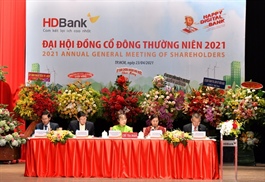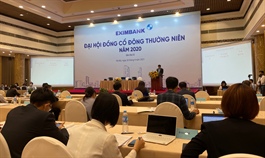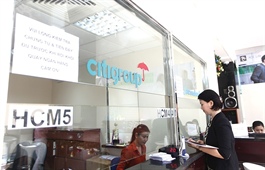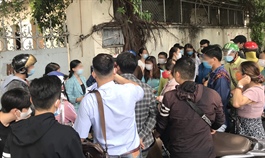Added engagement quells manipulator tag
Added engagement quells manipulator tag
Last week, the Biden administration reversed the US Treasury Department’s decision from December to label Vietnam a “currency manipulator”. That reversal effectively eliminated the risk that the United States will impose stiff tariffs on Vietnam for the time being.

By Michael Kokalari - Chief economist, VinaCapital
|
We believe there are three reasons why the US dropped Vietnam’s designation as a currency manipulator. Firstly, Vietnam is a potentially important partner to the US to achieving its regional geopolitical objectives, and this importance has been magnified by recent developments in the East Sea, as well as by a continuation of US-China tensions in the new Biden administration.
Secondly, Joe Biden’s team is taking a less confrontational stance towards US trading partners, evidenced by the fact that the US Treasury also reversed its designation of Switzerland as a currency manipulator, and that US officials chose not to label Taiwan as one in its most recent report to the US Congress. Both Switzerland and Taiwan are more egregious currency manipulators than Vietnam, according to the US Treasury’s own criteria.
Thirdly, at the end of 2020, Vietnam satisfied all three of the US Treasury’s criteria for a country to be considered a currency manipulator, but the nation is not likely to satisfy these criteria again at the end of 2021.
Notwithstanding all of the above, the US Treasury’s report to Congress on macroeconomic and foreign exchange policies of major trading partners of the US from April asserted that the VND was more than 10 per cent undervalued at the end of 2020, after having depreciated slightly in real terms, including the impact of inflation, from the end of 2019, when the VND was nearly 8 per cent undervalued.
Furthermore, Asia’s trade surplus with the US, including Vietnam’s, looks set to explode in the months ahead, according high-frequency economic data, including a surging number of container shipments to ports on the west coast of the US.
In order to address all of these issues, US Treasury officials entered into enhanced bilateral engagement with the Vietnamese authorities in early 2021, according to the the department’s above-mentioned report to the US Congress. We believe those discussions included commitments from Vietnamese authorities to ramp up imports of liquefied natural gas from the US to shrink Vietnam’s trade surplus with the US.
We also expect the State Bank of Vietnam (SBV) to encourage a gradual appreciation of the VND going forward to address the US government’s concerns about the undervaluation of Vietnam’s currency. These concerns were also raised by US Trade Representative Katherine Tai with Vietnam’s then-Minister of Industry and Trade, Tran Tuan Anh, in a discussion at the end of March.
The US Treasury uses three numerical criteria to assess whether a country could be suppressing the value of its currency to boost the competitiveness of its exports, although the final decision to label a country a currency manipulator is a discretionary one.
Those criteria are that the country has a trade surplus with the US of over $20 billion in goods, but not services; the country had a current account surplus equivalent to 2 per cent (or more) of its GDP over the previous 12 months; and the country’s central bank accumulated foreign reserves worth over 2 per cent of its GDP over the previous 12 months.
Vietnam met all three criteria at the end of 2020. The country had a $70 billion trade surplus with the US in 2020, a 3.7 per cent per GDP current account surplus, and the State Bank of Vietnam bought 4.4 per cent of its GDP worth of foreign currency reserves in 2020, according to the US Treasury. However, Vietnam is unlikely to meet the surplus criteria by the end of 2021, for a few reasons.
Firstly, Vietnam’s trade surplus, which is the most important contributor to the current account surplus, surged from 4 per cent of its GDP in 2019, to 7 per cent in 2020, but is likely to recede back to 4 per cent in 2021 because foreign-invested enterprises (FIEs) are aggressively importing and restocking the production inputs, they require to manufacture their products.
Secondly, the International Monetary Fund (IMF) is helping Vietnamese officials solve certain technical issues that will reduce both the country’s current account surplus and the “errors and omissions” in Vietnam’s balance of payments account, by tracking the profits the FIEs send back to their home countries each year more carefully.
And thirdly, the Biden administration is likely to loosen the threshold from 2 per cent of the GDP to 3 per cent, which was the surplus criteria before the Trump administration lowered it in order to make it easier to justify imposing tariffs on US trading partners.
Last week’s US Treasury Department report to Congress reaffirmed that Vietnam’s foreign cash reserves were about 8 per cent above the IMF’s recommended amount of reserves for Vietnam at the end of 2020. This marks a major improvement since the beginning of 2019, when the SBV’s reserves were 24 per cent below the recommended level.
To put that 8 per cent figure in context, the US Treasury’s April 2021 report also asserted that Thailand’s foreign currency reserves were 221 per cent above the recommended level at the end of 2020, and that the value of the Thai baht is undervalued by about 10 per cent. Note that Thailand was put on the US Treasury’s monitoring list of potential currency manipulators.
























